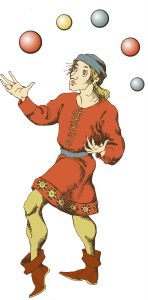 Writing and editing, that’s what I do. As do so many other members of the NAIWE. But what’s the relationship between the two activities? Is one more enjoyable or rewarding than the other? I began my professional life as a reporter and features writer for a Connecticut weekly. I then worked as the arts editor of another Connecticut paper, the New Haven Advocate. Then, in the late 80s, I decided to get a degree in social work (community organizing and social planning) because of the AIDS crisis. I felt I had to make a contribution to fighting this terrible epidemic that was killing so many and exposing not only the bigotry against people who had HIV but also the inadequacies and inequities of our country’s health care system. Although I continued to contribute articles to such publications as The Nation, Newsday, Film Comment, the SoHo Weekly News, and The Advocate, I mainly worked as a program planner and writer/editor for government and non-governmental agencies. And somehow, while working full-time in public health, I managed to write my first book, An Offer We Can’t Refuse: The Mafia in the Mind of America (Farrar, Straus, Giroux). (I was able to write the book because I had a supportive boss who allowed me to rearrange my schedule.)
Writing and editing, that’s what I do. As do so many other members of the NAIWE. But what’s the relationship between the two activities? Is one more enjoyable or rewarding than the other? I began my professional life as a reporter and features writer for a Connecticut weekly. I then worked as the arts editor of another Connecticut paper, the New Haven Advocate. Then, in the late 80s, I decided to get a degree in social work (community organizing and social planning) because of the AIDS crisis. I felt I had to make a contribution to fighting this terrible epidemic that was killing so many and exposing not only the bigotry against people who had HIV but also the inadequacies and inequities of our country’s health care system. Although I continued to contribute articles to such publications as The Nation, Newsday, Film Comment, the SoHo Weekly News, and The Advocate, I mainly worked as a program planner and writer/editor for government and non-governmental agencies. And somehow, while working full-time in public health, I managed to write my first book, An Offer We Can’t Refuse: The Mafia in the Mind of America (Farrar, Straus, Giroux). (I was able to write the book because I had a supportive boss who allowed me to rearrange my schedule.)
After more than twenty-five years working in public health, I left full-time employment to concentrate on writing and editing. My experience in public health, focused mostly on HIV/AIDS, taught me a lot not only about that field but also about editing. Having to craft compelling messaging that could keep people from becoming ill and dying was a challenge much more daunting than writing a feature article or an arts review. And editing writing by physicians and other medical professionals so that it was accessible to their intended audiences was even more challenging. But it also was great preparation for what I would do after leaving full-time employment: editing books.
At first, the transition was awkward, and it took me a while to adjust and build a client base. But before long, I was working with both publishers, academic and trade, and directly with authors, on nonfiction books. I’ve edited histories of the Middle East, the memoir of a heavy metal rockstar, the biography of a founder of forensic science, an expose’ of electronic surveillance and disinformation, a first-hand account of Cuba’s economic crisis after the fall of the Soviet Union, and many other titles. I found I loved working on other writers’ work, helping them to say what they wanted to say as effectively as possible. I also found that editing their work improved my own writing. I read my own work much more closely and critically. Editing definitely has made me a better writer. I’ve managed to juggle writing and editing projects pretty well; I am now finishing my second book, about the Sicilian/Italian history of New Orleans. My work life has been like this: I work on editing and my own writing on alternate days for the most part; sometimes, though, one project, usually an editing assignment, will take priority. It’s an arrangement that works well for me, and one I enjoy and find creatively fulfilling.
